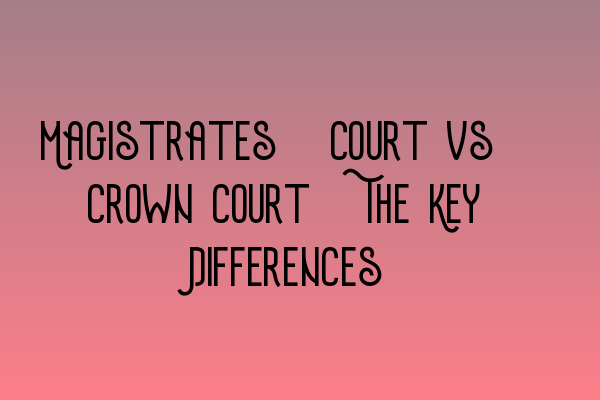Magistrates’ Court vs. Crown Court: The Key Differences
When it comes to the criminal justice system in the UK, two important courts to understand are the Magistrates’ Court and the Crown Court. Whether you are studying for the SQE 1 Practice Exam Questions or interested in SQE 2 Preparation Courses, it is crucial to grasp the distinctions between these two courts.
1. Jurisdiction
The Magistrates’ Court is the lower court in the criminal justice system. It has jurisdiction over less serious offenses, such as minor theft, public order offenses, and road traffic violations. The cases heard in the Magistrates’ Court are generally summary offenses, which means they are less severe and have a maximum penalty of six months’ imprisonment or a fine.
On the other hand, the Crown Court deals with more serious offenses, including indictable offenses like murder, rape, and robbery. It also handles either-way offenses, which can be tried in either the Magistrates’ Court or the Crown Court. These offenses are typically more complex and carry higher penalties.
2. Trial Procedure
In the Magistrates’ Court, trials are usually conducted by a panel of magistrates who are not legally qualified. They are assisted by a legal adviser and decide on both guilt and sentencing. It is worth noting that some cases heard in the Magistrates’ Court can be tried by a District Judge.
Contrastingly, the Crown Court is presided over by a qualified judge and a twelve-person jury. The jury decides whether the defendant is guilty or not guilty based on the evidence provided during the trial. If the defendant is found guilty, the judge determines the appropriate sentence.
3. Sentencing Powers
While the Magistrates’ Court can impose more lenient sentences, such as fines, community orders, and short-term imprisonment, the Crown Court has wider sentencing powers. The Crown Court can impose longer custodial sentences, including life imprisonment for the most serious offenses.
4. Appeals
If a defendant is not happy with the outcome of their case in the Magistrates’ Court, they can appeal to the Crown Court. This is known as a “retrial on appeal” and is determined by a judge and two magistrates. If the defendant is not satisfied with the decision of the Crown Court, they can further appeal to the Court of Appeal.
In the case of the Crown Court, the appeal process lies with the Court of Appeal, and in some cases, the Supreme Court. Appeals can be made against conviction, sentence, or both. However, it is essential to seek legal advice to understand the specific grounds and procedures for appealing.
These are just a few of the key differences between the Magistrates’ Court and the Crown Court. Whether you are preparing for the SQE 1 Preparation Courses or want to pursue a career in criminal law, having a thorough understanding of these courts is essential.
If you have any questions or require legal assistance, please contact our expert team at SQE Criminal Law & Practice Law UK.
Sources:
